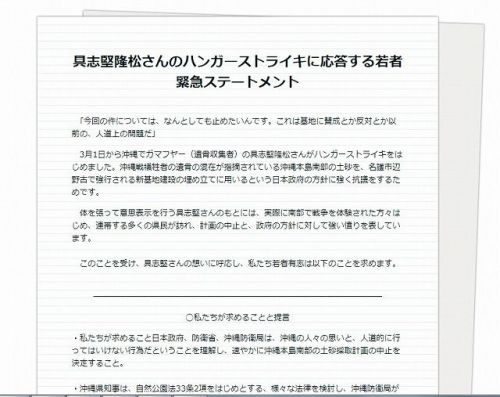Urgent youth statement calling for halt in plans to obtain soil published online: “Support for Gushiken’s hunger strike”

The urgent statement released by young people to support Takamatsu Gushiken’s hunger strike.
March 10, 2021 Ryukyu Shimpo
On March 6, an urgent youth statement in support of Takamatsu Gushiken’s hunger strike and calling on the Japanese government to halt plans to obtain soil from the southern part of Okinawa Island was published online by a group of young people in their twenties both in and outside of Okinawa prefecture. Gushiken is a representative of the Gamafuya, a group of volunteers who search for the remains of war dead from the Battle of Okinawa. Gushiken went on a hunger strike to call on the government to abandon its plans of obtaining soil from the southern part of Okinawa Island, where there are remains of the war dead, for use in the construction of the new military base at Henoko. People who support the youth statement can add their signature at the site where the statement was posted. As of March 9, 60 students and other young people in and outside of Okinawa had added their signatures.
Six individuals have signed on as promoters of the statement, including Jinshiro Motoyama, former representative of the Henoko Kenmin Tohyo no Kai (the Group for the Henoko Prefectural Referendum) and a doctoral student at Hitotsubashi University’s Graduate School of Law, and Yuto Ishikawa, a fourth-year student at Okinawa International University who is working to record and inherit the legacy of the Battle of Okinawa. Two-thirds of supporters are young people outside of Okinawa.
The statement calls on the Japanese government and other groups to halt plans to obtain soil from the southern part of Okinawa Island, and for the governor of Okinawa to halt plans and consider placing limitations on such activity. The statement further asserts that the issue relates to how Japan has dealt with the aftermath of the war, and to democracy itself, and thus that every single person in Japan should learn about and discuss the issue with the awareness that it directly concerns them.
Keigo Nishio, from Ibaraki, Osaka, is also among the statement promoters. He supports the work of those gathering the remains of the dead from the Battle of Okinawa, and proposed the idea of publishing the statement. He spoke with Ishikawa, who he met through work related to peace education, and made the statement a reality. Nishio says, “I saw how Mr. Gushiken was risking his life to bring attention to this problem, and was very moved. I wanted to figure out what I could do as someone from the main islands of Japan. I wanted to answer his call.” Ishikawa says, “My goal is for more people to understand the feelings of the bereaved, and to create a space where Okinawans and people from the rest of Japan can think about these issues together.” They plan to host a talk on Zoom in the near future.
(English translation by T&CT and Ellen Huntley)
Previous Article:FA18 jets fly at MCAS Futenma 25 years after return agreement, harm continues with 115 decibel noise
Next Article:Three university students urge pressure on government to protect remains of war dead
[Similar Articles]
- “Respect the War Dead” Gushiken’s Hunger Strike in Front of Yasukuni Shrine on Memorial Day for the End of the War Draws Attention to the Issue of War Dead Remains at Okinawan Battleground
- Over 30,000 signatures calling for Japanese Government to halt plans to use soil from Southern Okinawa Island, Gamafuya representative Gushiken also calls for DNA testing on remains
- “Using soil mixed with human remains is a desecration of the dead”: Gamafuya submits letter to OPG requesting disapproval of soil use in Henoko construction
- Hunger-striking Takamatsu Gushiken claims to foreign media, “The U.S. has a concerned interest in the dirt excavation.”
- Prefectural assembly asks that soil containing war dead remains not be used in land reclamation
 Webcam(Kokusai Street)
Webcam(Kokusai Street)


